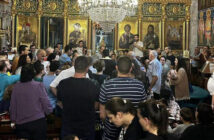via Public Orthodoxy

Amid the growth of Islamist persecution in the last few years, a variety of think tanks and politicians have sought to bring the plight of Christians in the Middle East to the forefront of American politics. Amid such fervor, Israeli leaders have also claimed their role in the defense of Christians. Prime Minister Netanyahu recently told a Jerusalem gathering of over 180 Christian media representatives that Israel is the protector of the Christian people and “the only place in the Middle East” where Christians have “the freedom to worship as they please.” Together, he explained, Christians and Israel stand against Islamic fundamentalism. Indeed, many American Christians concur.
A likely reason why this media gathering, organized by Netanyahu’s Press Office, featured prominent Israeli officials and a visit to Israeli settlements, but no local Christian representatives nor visits to local Christian villages, is that most Christians of the Holy Land do not share the rosy view of the State of Israel that Netanyahu’s government wishes to promote. So why the disconnect?
When Ted Cruz was booed off stage at a 2014 gathering of In Defense of Christians after he espoused a defiantly pro-Israel position (“Christians have no greater ally than the Jewish State,” he declared), his statement afterward offered a simple reason: antisemitism. Samuel Tadros, a Coptic writer who himself has done much to promote an awareness of Middle Eastern Christianity in American politics, a few weeks ago offered a far less simplistic, but still slanted, explanation of Middle Eastern Christian views of Jews and Israel, which, he notes, are “at once more intricate and more contradictory than they might appear at first glance.”
Tadros points to four particular reasons why the majority of Middle Eastern Christians view Israel negatively. First, Eastern Christians have had historical tensions with Jews that continue to dominate the Christian mindset. Second, most Christians in the Middle East hold to what Tadros calls “replacement theology” (what others may term “supersessionism”)—the notion that Christians have replaced Jews as the “New Israel.” Third, he points to “the importation of European anti-Semitism,” and, finally, he looks to the “often-cited role of the Arab-Israel conflict.” On this last point, he observes, “Middle Eastern Christians are inundated with the same relentlessly anti-Israel and anti-Semitic narratives—received from home, school, and the media—as are their Muslim compatriots. Dissent from this worldview can result in social ostracism or even physical danger.” In other words, it is poor portrayals of this conflict and fears of Muslims that have contributed to Christian discontent with Israel.
While historians of Jewish-Christian relations (myself included) will find much at fault in Tadros’s overview of Eastern Christian theology and history, the issue is really not in what he says but in what he leaves out. And this is a problem one finds frequently among writers who seek to bring the American “pro-Israel” and “defense of Christians” communities together in their common fight against Islamism (and, often, Iran). What is missing here is any sense of Christian discontent with Israel rooted neither in historical animosity, replacement theology, antisemitism, misinformation, nor fear of Islamic reprisal, but in something far simpler: the Israeli government’s own policies.
When Israel’s Justice Minster suggests that maintaining the Jewish majority in Israel may come at the “expense of equality,” or its Tourism Minister openly supports “Judaizing the Galilee” (where the majority of Israel’s Christians live), or its Education Ministry promotes literature for public schools that declares that Arabs “will not sit quietly” until they “throw us all into the sea,” would not those who identify as Arab (as the majority of Christians in Israel do) have a legitimate concern rooted neither in historical tension with Jews nor Christian antisemitism? When Jerusalem’s Palestinian residents (80% of whom live below the poverty line) make up nearly 40% of the city’s population but are allocated only 12% of the city’s budget and are therefore ensured a multi-billion-dollar gap in infrastructure replete with severe shortages in classrooms, roads, water, trash pickup, sewage, drainage, parks—in addition to inequalities in the city’s taxation system, property and voting rights, the rule of law, marriage and family rights, immigration processes, and social services—would not the Christians among them be troubled for reasons other than “replacement theology?” (Some of the following points regarding Jerusalem I have argued more fully elsewhere.) When lands once belonging to the Orthodox Christian villages of Beit Sahour and Beit Jala are among the 35% of privately-owned Palestinian land in East Jerusalem annexed after 1967, and which now houses twelve Israeli settlements (“neighborhoods”), would not Christians have cause for dismay other than fear of their Muslim neighbors? Should not the near thirty-foot wall that now divides these villages from Jerusalem—and ensures that local Christians no longer have regular freedom of access to Jerusalem’s holy sites—rightly trouble local Christians? When one can stand in a Christian village in the West Bank whose intermittent and insufficient access to water is controlled by the Israeli government, while an Israeli settlement’s luscious, green vegetation is easily visible on a hilltop nearby, is there no reason for discontent beyond mere misinformation?
These are but a few facets of the Israeli government’s ongoing practices. One could turn to its recently passed and discriminatory “nation-state” law (as described by Israel’s own president)—which local Catholic leaders are calling to be repealed—to explore more.
In this environment, it is no surprise that when Netanyahu hailed Israel as “the only country in the Middle East were Christianity thrives and grows” at the Christian press gathering in October, the Christian Mayor of Bethlehem responded, “We would like to advise Mr. Netanyahu to stop using Christians as a tool to whitewash the occupation.”
None of these points serve to deny that Christians in Israel, as Netanyahu likes to point out, are better off than among other major power brokers in the region (a contest in pluralism when Saudi Arabia is the other major player and Lebanon is routinely ignored is not difficult to win). Nor do these points suggest that the Palestinian Authority is itself innocent, or that Islamic fundamentalism has not left a frightening wake of shed blood, or that antisemitism is not alive and well in the Middle East.
The point, rather, is this: If one seeks to give a defense of Christians in the Middle East that elevates their flourishing above any other political agenda, only a deleterious dismantling of the evidence would allow one to look to the Israeli government’s ongoing, nationalistic policies as part of the solution. The genuine guilt of one can never serve to invent the innocence of another.
Michael G. Azar, PhD, is Associate Professor of Theology and Religious Studies at the University of Scranton.
Public Orthodoxy seeks to promote conversation by providing a forum for diverse perspectives on contemporary issues related to Orthodox Christianity. The positions expressed in this essay are solely the author’s and do not necessarily represent the views of the editors or the Orthodox Christian Studies Center.
via Public Orthodoxy



